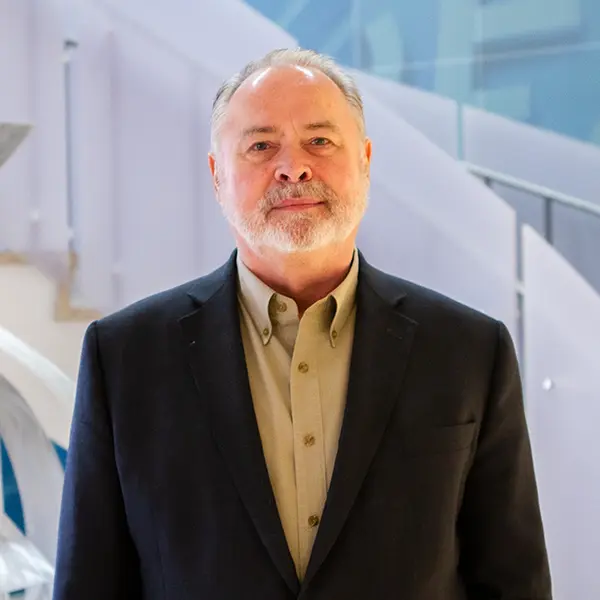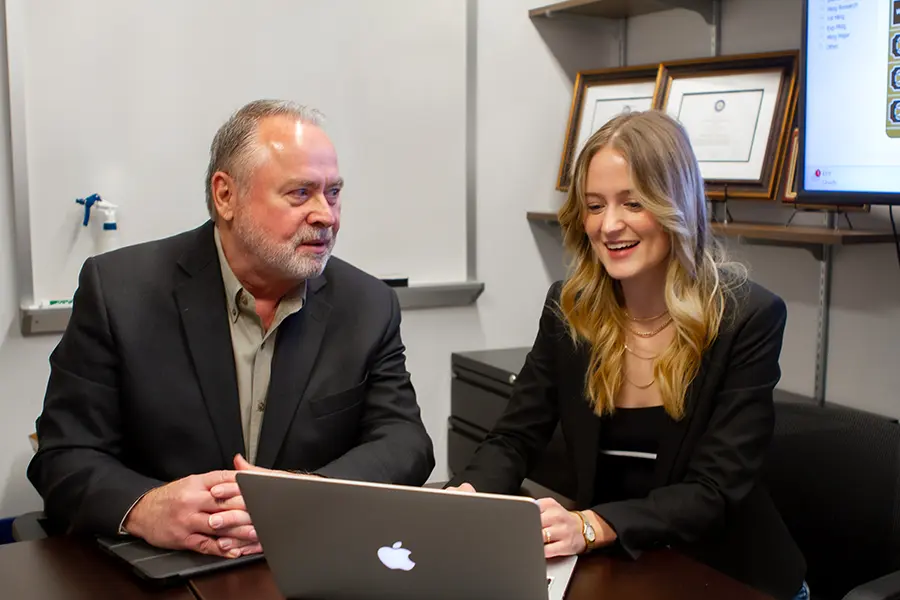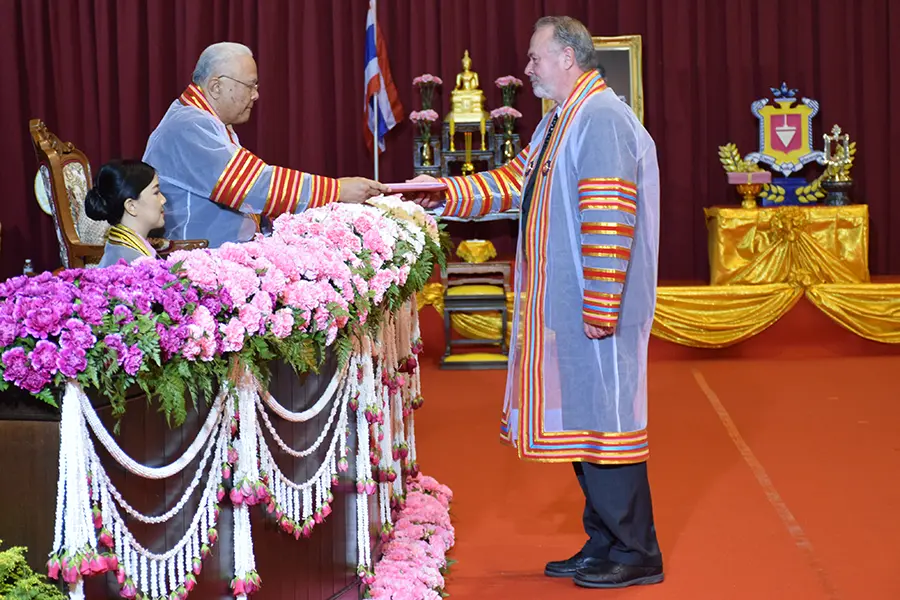
“Improve the well-being of someone, somewhere in the world,” challenges Chad Allred, professor of marketing, to his International Marketing students. This challenge evolved out of his personal humanitarian work, love of travel and the relationships he cultivated through both. What started with trips to Thailand, Cambodia and Laos progressed into class projects that partner Daniels School of Business students with humanitarian organizations around the globe.
Knowing that such organizations have limited resources, usually reserved to address the needs of those they serve, Allred structures his class projects so his undergraduate students use their marketing skills for good. While that’s always been the objective for his students, how that’s been executed over the years has been refined.

Many of the organizations have been partnering with Allred’s classes year after year, building upon the past efforts of previous classes. Presently, his class is divided into teams working on various marketing projects for 19 nonprofits in 22 nations.

The seeds from which these projects blossomed were planted in Southeast Asia 45 years ago when Allred was a missionary in Thailand. He traveled during the tumultuous two years following the fall of Saigon in Vietnam, a period concurrent with the Khmer Rouge’s Killing Fields in Cambodia. After his return to the U.S., he finished college and entered the workforce. But his love for travel and that region compelled him to return a decade later. He traveled with his brother through Southeast Asia, then the Eastern Block while the Berlin Wall was coming down.
In 1991, he enticed a second brother to accompany him on a trip to Hawaii to watch a total eclipse of the sun. On that trip, his life changed. He met Anne Marie, his future wife, “a beautiful Korean-American woman.” She was living with mutual friends in a beach house on the North Shore of Oahu. Smitten, he traveled back to visit her several times. One visit, she asked him to go out to the beach and wait. While he rested in a hammock, he remembers, looking out at a full moon reflecting on the smooth-as-glass ocean, she came walking down the beach accompanied by two Polynesian friends with guitars. She sat in the hammock beside him and serenaded him with Hawaiian love songs.
“It was surreal, like something that happens only in the movies,” says Allred. They married the following year on the anniversary of the eclipse. “That’s the kind of person I now get to travel with,” says Allred, “beautiful and adventurous.” When their five children were young, they began taking the family on road trips covering 49 of the U.S. states.



In 2013, when their oldest was 19 and youngest was 9, Allred and his wife decided to embark on a 10-week family backpacking trip through Southeast Asia. He and Anne-Marie thought it would build stronger ties with their children and prevent some of the ego-centric and ethno-centric mindsets their kids might develop. In their first weeks, they wandered through Thailand, Malaysia, Singapore and Indonesia, making border crossings into Cambodia, Myanmar and Laos. They spent their last month in Chiang Mai Valley in the Golden Triangle region of Southeast Asia. Here, they served together as a family at an orphanage. They also taught English lessons at a small local university, making close friends along the way.
The trip through Southeast Asia sparked ideas for Allred, who had transitioned from a high-tech corporate executive to a university professor. How could he create more transformative educational experiences? The next year, in 2014, he set up a study abroad course and traveled with his students to Baan Tawai Village, an internationally famous woodcarving village. Baan Tawai was facing economic hard times. Many tourists and customers had been drawn away from the village toward the elephant camps, tiger kingdom and orchid farms in the north of Chiang Mai Valley.
Using North Chiang Mai University as a launchpad, Allred challenged his first study abroad group to conduct exploratory research. He divided 16 students into three teams. One went into the village, interviewing the artisans creating the woodcarvings, the monks coordinating social activities and the shop owners selling carvings. Another team went out into the surrounding communities where they interviewed potential customers in the local markets and other locations. The third group studied those who organized excursions into the region or transported potential customers to the village.
On his second study abroad trip a year later, Allred divided students into two teams to help the village. The first set out to develop an international supply chain, and the second sought to create public awareness. Within days, the supply chain team learned that the cost of obtaining an export license was often greater than the cost of the spectacular teak carvings themselves. That team started investigating why and found that middlemen were heavily inflating the cost of the licenses. They traveled from government agency to government agency until they found the one official in charge of authorizing individuals who could issue these licenses. They discovered that by working closely with the government, they could establish their own low-cost licensing process, reducing the overall cost of an exported product. The government was not interested in profiting from the sale of teak products, the official revealed. It only wanted to protect the country from deforestation.
“That’s the type of lesson students learn when they are determined to solve a difficult problem. The discovery of real solutions often requires tenacity and a profound understanding of the environment — that is, the culture, social norms and laws. The application of these solutions requires strong, trust-based relationships,” says Allred.

Since those earlier years working with students in Thailand, Allred has traveled back to the country many times to initiate and coordinate new projects, working with local leaders and experts to improve the well-being of individuals and communities. Where possible, he seeks to engage the expertise of professors from across the Purdue campus. For one project, he and his students worked with Chad Jafvert, professor of environmental and ecological engineering, to examine how water purification technologies might be cost-effectively introduced into a remote mountain village. On another occasion, he traveled with Philip Low, distinguished professor of chemistry-biochemistry, seeking out potential field study locations for malaria treatments.
Allred will travel to Southeast Asia again this summer, working to identify new opportunities where he and his students, friends and university colleagues might work together with local leaders to improve the well-being of others.
The Golden Triangle in Thailand. Photography by Shankar S., licenced under Creative Commons CC BY 2.0
Allred began introducing these developing Thailand projects — the continued revitalization of the woodworking village’s economy and the introduction of cost-effective water purification technologies into remote mountain villages — into his International Marketing course. He acted as the primary project interface, providing the students the project structures and introducing them to the Thais with whom they’d be working. Over time, new projects arose: agricultural research, rural education and eco-tourism.
As the class grew, it soon became clear he’d need even more projects, preferably based in other areas of the world. Allred began a search for outside humanitarian organizations needing marketing assistance who would be willing to involve students in their efforts. In time, he encouraged students to tap their own networks, youth groups, faith communities and international connections to bring new clients into the fold. The students’ personal connections, like his, were the foundations. Yet, with all the variety, the overall objective remained. Use marketing skills to make the world a better place.
Through these projects, students become part of their international client’s marketing efforts. They become involved in mission-critical marketing activities such as developing social media, building websites, raising funds, and managing events, not just secondary research.

One important client organization is Elevita, an online international marketplace that cofounder Kirsten Monson created to elevate the work of artisans that she had met on her own world travels. Monson “loves working with the students. She wants to inspire a new generation to become involved in meaningful, humanitarian activities throughout their lives,” says Allred. “As our clients gain experience with our students, they learn to craft focused projects that build upon past efforts. And they get to work with truly amazing students like Megan!” He’s referring to senior Megan Earley, who helped upgrade the look and feel of Elevita’s e-commerce platform and further developed their business model to expand the existing customer base in 2023. Earley continued her work with the organization long after the marketing class wrapped up and served the following year's course team as Elevita’s liaison in 2024.
Successes like Allred’s, Monson’s and Earley’s are born out of their internal standards of excellence, love of a challenge and affinity for helping people. Their reward is building strong friendships: Earley and Monson, Allred and faculty at North Chiang Mai University.
In 2020, North Chiang Mai University awarded Allred an honorary doctorate for his efforts in Thailand. “The chair of the university board came up to me and said, ‘This honorary degree is not being awarded because of any specific accomplishment. It is being awarded because year after year you came back with your family to serve our university, our community and our people. It is because your projects were always focused on benefiting our university and our community. You weren't interested in what was in it for you. You were genuinely interested in us,’” says Allred.

“The graduation ceremony was delightful. Instead of having an orchestra playing the graduation march as is customary in the U.S., a row of seven Buddhist monks in saffron robes chanted blessings,” says Allred.
In a dream world, Allred would continue traveling with students to solve international marketing challenges, but not every student can travel. Hence the adaptations, but those have multiplied the reach and the impact of his class projects. Cross-business culture and intercultural lessons remain potent teaching tools for his students.
Be culturally sensitive – even business culturally sensitive – Allred cautions students. “Don’t push your ideas on the client. Instead, begin by listening. The client organization has been living and sacrificing for their customers. I tell the students to interview their clients before they detail their projects. Understand the client’s situation and circumstances. Understand their mission and goals. Get to know their target customers and the good they seek to provide. Make sure that you are on the same page and that your plans are in alignment. Then you will know that your project deliverables will naturally fold back into a master plan and help achieve the client’s overall mission.”